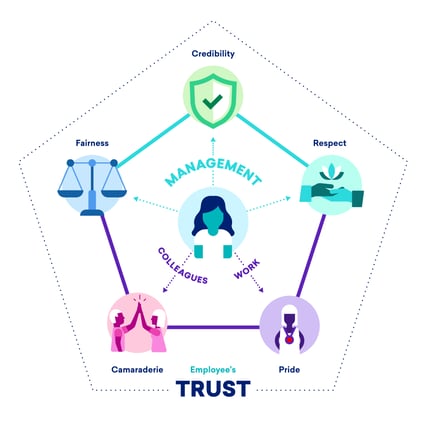
In today's whirlwind of emails, meetings, and deadlines, trust becomes the superhero, saving the day in our work lives. Trust in the workplace is the guiding force that propels individuals and teams towards greatness. At Great Place to Work we have identified several crucial elements fundamental to creating a workplace environment built on trust. Let’s dive in.
Trust in the Workplace: 3 essential elements to consider
By emphasising the importance of investing in workplace culture, leaders can demonstrate the long-term benefits that outweigh short-term cost-saving measures. Trust in the workplace becomes a strategic asset that enhances resilience, fosters employee engagement, and drives sustained success, even in challenging economic times.
Great Place to Work research highlights three essential components that lay the foundation for a trust-based culture:
- Credibility: Do people believe leaders are competent, communicative, and honest?
- Respect: Do people feel respected both as professionals and individuals with lives outside of work?
- Fairness: Do people see the organisation as a place where everyone has a fair chance to succeed?

Based on the data presented in the table below, 82% of employees in great workplaces, as indicated by the Trust Index©️ Employee survey, have a strong belief in their organisations' credibility, whereas the percentage drops to 53% for non-certified organisations.
81% of employees in great workplaces feel respected within their organisations, compared to only 49% in non-certified organisations. Additionally, 81% of employees in great workplaces believe they are treated fairly, in contrast to 55% of employees in non-certified organisations. These findings underline the positive impact of a trust-based culture on employee perceptions of credibility, respect and fairness in the workplace.
|
Core Dimensions |
Certified organisations |
Non-Certified organisations |
|
Credibility |
82% |
53% |
|
Respect |
81% |
49% |
|
Fairness |
81% |
55% |
There is a clear distinction between great workplaces and non-certified organisations in terms of credibility, respect, and fairness. The higher percentages of employees in great workplaces who believe in their organisations' credibility, feel respected and are treated fairly demonstrate the positive outcomes of a trust-based culture.
On the other hand, the lower percentages among non-certified organisations suggest room for improvement in fostering trust and creating a supportive work environment. These findings emphasise on the importance of cultivating trust to enhance employee satisfaction, employee engagement, and overall organisational performance. Organisations should prioritise building a culture of trust to reap the benefits of a motivated and committed workforce.
Trust in the Workplace: Actions Speak Louder Than Words
To build trust within an organisation, actions carry far more weight than words. Great workplaces understand this principle and have implemented impactful strategies to foster trust.
Did you know? 86% of employees from great workplaces responding to the Trust Index©️ Employee survey believe that “Management trusts people to do a good job without watching over their shoulders.” compared to 61% of employees in non-certified organisations. Let's take a closer look at some contrasting leadership styles that can make or break trust in the workplace:
-
Leading by example vs. saying but not acting
Great leaders understand the power of leading by example. They don't just talk the talk; they walk the walk. By embodying the values and behaviours they expect from their employees, they establish a solid foundation of trust.
.png?width=556&height=417&name=People%20are%20encouraged%20to%20balance%20their%20work%20life%20and%20their%20personal%20life.%20(1).png)
78% of employees from great workplaces responding to the Trust Index© Employee survey report that “Management's actions match its words.” compared to 44% of employees from non-certified organisations.
Consistency between words and actions is crucial for building trust. This highlights the importance of integrity and credibility in fostering a trustworthy work environment.
-
Holding accountability for results vs. micromanaging
Trust flourishes when leaders hold themselves and their teams accountable for results. Think about it as the employee being a trapeze artist and leaders its safety net. Leaders provide guidance, resources, and support while empowering their employees to take ownership of their work. On the other hand, micromanaging is like tying knots in the safety net, creating a tangled mess that restricts movement and erodes trust. It sends a message that the trapeze artist isn't trusted to perform their acrobatics, stifling their autonomy and leaving them hesitant to take daring leaps. To foster trust, leaders must be the safety net that empowers their teams to reach new heights and create a thrilling show of success.
.png?width=556&height=417&name=People%20are%20encouraged%20to%20balance%20their%20work%20life%20and%20their%20personal%20life.%20(2).png)
86% of employees from great workplaces responding to the Trust Index© Employee survey agreed that: “Management trusts people to do a good job without watching over their shoulders.” compared to 61% of employees from non-certified organisations.
Trust-building efforts have a positive impact on empowering employees and fostering autonomy. This demonstrates the importance of trust in creating an environment where individuals can thrive and contribute to the organisation's success.
-
Viewing mistakes as an opportunity to learn vs. an opportunity to punish
In a trust-driven workplace, mistakes are seen as valuable learning experiences. Great leaders foster an environment where individuals are encouraged to take risks, learn from failures, and grow. Conversely, leaders who use mistakes as opportunities for punishment breed fear and discourage innovation, eroding trust and employee development.
.png?width=556&height=417&name=People%20are%20encouraged%20to%20balance%20their%20work%20life%20and%20their%20personal%20life.%20(3).png)
78% of employees from great workplaces taking the Trust Index© Employee survey agreed to “We celebrate people who try new and better ways of doing things, regardless of the outcome.” compared to 42% of employees from non-certified employers.
This highlights the positive impact of a supportive and innovative work culture on employee mindset and organisational success.
-
Making sure everyone is included vs. implementing a "one-size-fits-all" approach
Inclusive leadership is a cornerstone of trust in the workplace. Great leaders recognise the unique strengths and perspectives of each individual and create an environment where everyone feels valued and heard. They embrace diversity and adapt their leadership style to meet the needs of different team members. Conversely, leaders who enforce a rigid "one-size-fits-all" approach exclude voices, and creativity, and erode trust among their employees.
Leaders at Alcon received cultural competency training and unconscious bias training. Alcon Ireland has an active Diversity & Inclusion team at a site that has a calendar of events and initiates that take place throughout the year to continuously enhance Alcon’s culture.
More resources about inclusive workplaces:
- Trans-Inclusive Workplace: Why it's important and how you can be more inclusive?
- How to Hire: Culture Fit vs Inclusive Culture?
- How to Promote and Support Disability Inclusion in the Workplace
-
Applying your work culture to ALL vs. culture only existing in office activities
.png?width=556&height=417&name=People%20are%20encouraged%20to%20balance%20their%20work%20life%20and%20their%20personal%20life.%20(5).png)
78% of employees taking the Trust Index© Employee survey believe that “We're all in this together.” compared to 49% of employees from non-certified organisations.
This highlights the importance of trust in creating a cohesive work environment and promoting collective effort.
A strong work culture is essential for trust in the workplace to thrive. Great workplaces ensure that their culture is not limited to surface-level office activities but permeates every aspect of their organisation. They foster a sense of belonging, whether employees are working on a production line or on the road, create an inclusive environment where everyone feels connected and valued. Leaders who neglect to extend their culture beyond office activities create a divide and erode trust within their teams.
-
Giving credit when it is due vs. taking the credit of your employees
Trust is strengthened when leaders acknowledge and give credit to their employees' contributions. Great leaders understand the importance of recognising and celebrating individual and team achievements. Conversely, leaders who take credit for their employees' work diminish trust and breed resentment.
Encouraging recognition for outstanding achievements is vital to empower every employee. Distilled has launched a value-linked peer-to-peer recognition system to democratise and encourage recognition, while rewarding behaviours which benefit the organisation's culture.
-
Building a clear and transparent decision-making process vs. letting unfair treatment and gossip spread
In a Great Place to Work episode of our webinar series, Workvivo CEO John Goulding talked about how his company is using communication as a valuable tool as a support for a seamless, strong and authentic internal communication. He mentioned the importance in providing a sense of ownership for employees and how they must feel informed about the direction the company is going in. When this occurs, staff feel connected to the wider mission of the organisation and give their best consistently.
Transparency and fairness are crucial for trust in the workplace. Great leaders establish a clear decision-making process, ensuring that employees understand how decisions are made and why. They communicate openly, share information, and address concerns promptly. Leaders who allow unfair treatment or gossip to spread erode trust and create an environment of uncertainty and suspicion.
.png?width=556&height=417&name=People%20are%20encouraged%20to%20balance%20their%20work%20life%20and%20their%20personal%20life.%20(8).png)
From the Trust Index© Employee survey responses of great workplaces’ employees, 75% responded “Management does a good job of assigning and coordinating people.” compared to 46% of employees from non-certified employers.
This indicates that great workplaces prioritise efficient and effective assignment and coordination of employees, which fosters a productive and harmonious work environment.
-
Cultivating a psychologically safe environment vs. thinking that well-being should be dealt outside of the organisation
Psychological safety is a vital element of trust. Great workplaces prioritise the wellbeing and mental health of their employees. They create a safe space where individuals feel comfortable expressing their ideas, concerns, and emotions without fear of judgment or reprisal. Leaders who dismiss well-being as an external concern undermine trust and hinder the overall success of their organisation.
.png?width=556&height=417&name=People%20are%20encouraged%20to%20balance%20their%20work%20life%20and%20their%20personal%20life.%20(7).png)
77% of employees who have taken the Trust Index© Employee survey believe that: “This is a psychologically and emotionally healthy place to work.” compared to 39% of employees from non-certified organisations.
This demonstrates the positive impact of trust-building practices on creating a supportive work environment. A psychologically and emotionally healthy workplace promotes employee well-being, satisfaction, and productivity.
Start with Trust in the Workplace
By prioritising trust in the workplace, organisations can create an environment that nurtures employee engagement, psychological safety, and collaboration. Implement the Great Place to Work Trust Index, actively involve employees, and cultivate psychological safety to foster a culture of trust.
Learn how to build trust in the workplace by subscribing to our monthly newsletter and join +3000 other leaders learning how to create a great workplace.
About Great Place to Work®
Great Place to Work® is the global authority on workplace culture. We help organisations quantify their culture and produce better business results by creating a high-trust work experience for all employees. We recognise Great Place to Work-Certified™ companies and the Best Workplaces™ in more than 60 countries. To join the thousands of companies that have committed to building high-trust company cultures that help them attract, retain and take care of their people, contact us about getting Certified today.
More resources on how to build a Great Workplace
- When is the Right Time to Join the Great Place to Work Programme?
- 7 Principles for Developing a Great People Strategy
- 10 Figures to Convince a Leadership Team of the Importance of Culture
- Mental Health Supports in the Workplace: A Mutually Beneficial Approach
- Fostering Resilience and Maintaining a Positive Image in Face of Crisis
- Paternity Leave in Ireland: Great Workplaces Advancing Shared Parenting
- A Great Workplace For All: Embracing LGBTQIA+ Inclusion Practices
- 6 Key Factors Successful Hybrid Working Models Have in Common
- Menopause and the Workplace: How To Best Support Your Employees
 Argentina |
Argentina |  Australia |
Australia |  Austria |
Austria |  Belgium |
Belgium |  Bolivia |
Bolivia |  Brazil |
Brazil |  Canada |
Canada |  Central America & Caribbean |
Central America & Caribbean |  Chile |
Chile |  Colombia |
Colombia |  Denmark |
Denmark |  Ecuador |
Ecuador |  Finland |
Finland |  France |
France |  Germany |
Germany |  Global |
Global |  Greater China |
Greater China |  Greece |
Greece |  Hong Kong SAR |
Hong Kong SAR |  India |
India |  Ireland |
Ireland |  Italy |
Italy |  Korea |
Korea |  Luxembourg |
Luxembourg |  Mexico |
Mexico |  Nigeria |
Nigeria |  Norway |
Norway |  Paraguay |
Paraguay |  Peru |
Peru |  Poland |
Poland |  Portugal |
Portugal |  Qatar |
Qatar |  Saudi Arabia |
Saudi Arabia |  Singapore |
Singapore |  Sri Lanka |
Sri Lanka |  Sweden |
Sweden |  Switzerland |
Switzerland |  The Netherlands |
The Netherlands |  Turkey |
Turkey |  United Arab Emirates |
United Arab Emirates |  United Kingdom |
United Kingdom |  United States |
United States |  Uruguay |
Uruguay |  Venezuela |
Venezuela | %20}})
-4.png?width=2160&height=2160&name=2021_gptw_logo_primary_red%20(1)-4.png)






